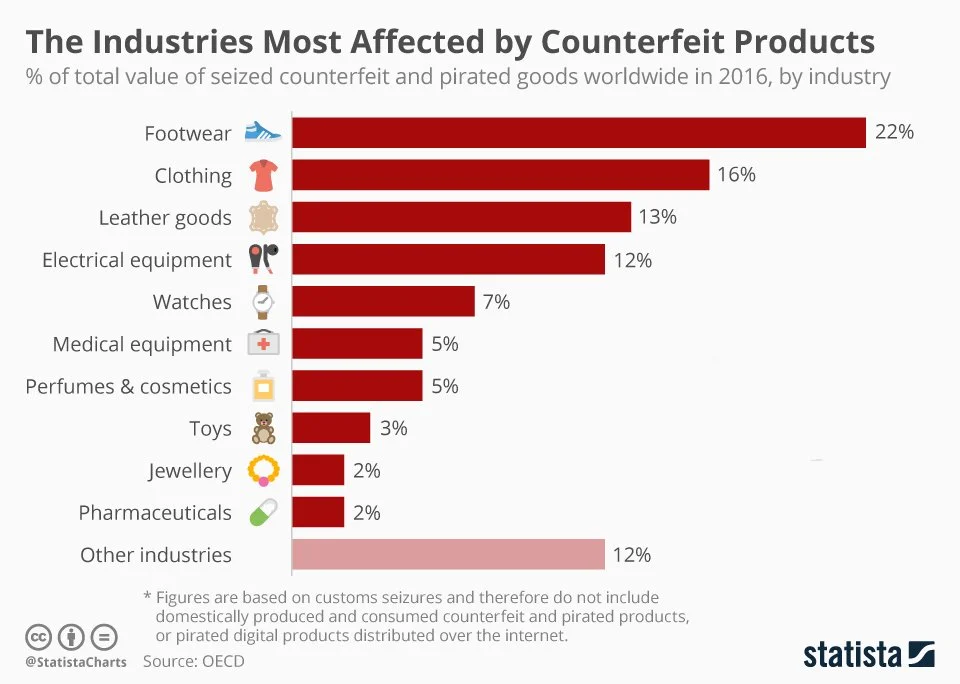Blockchain Technology for Supply Chain Management: Enhancing Transparency, Traceability, and Security
August 2025
Emerging technologies like blockchain are significantly improving supply chains around the world. Thanks to blockchain technology, supply chains can enhance their transparency, traceability, and security, all while reducing administrative costs.
Blockchain technology for supply chain management helps companies leverage an immutable and decentralized ledger to verify all cryptographic transactions and records. Businesses can record prices, dates, locations, quality, certifications, and additional relevant that enables them to more effectively manage their product’s supply chain. The risk of counterfeit products and a gray market significantly diminish, while visibility and compliance to industry or company standards are heightened.
Pacific Advisory recommends: Use blockchain technology for every touch point in your product’s supply chain to more effectively manage it, increase transparency, and reduce administrative costs.
Current Supply Chain Management Challenges
Supply chain management’s pain points became greatly amplified during the COVID 2020-2022 period. The supply chain was seen as incredibly vulnerable to major disruptions as we saw during those years, with those issues never fully going away.
Even outside of unique circumstances, supply chain management faces several challenges, including the following:
Lack of Transparency - Difficulty in tracking and tracing movements of products, as well as identifying bottlenecks and inefficiencies.
Fragmented Systems - Multiple stakeholders are involved, each with their own systems and processes, resulting in information silos that make it difficult to coordinate activities and share accurate data across the supply chain.
Inefficient Inventory Management - Inventory goes out of stock unexpectedly, leading to lost sales opportunities, customer dissatisfaction, and increased costs.
Demand Forecasting Inaccuracies - Supply chains struggle with inaccurate demand forecasting that results in products going out of stock or having excess inventory.
Counterfeiting & Fraud - Counterfeit products and fraudulent activities undermine supply chain integrity and brand reputation.
These challenges will vary across industries and business, but by and large are common issues faced by supply chain managers.
Using Blockchain for Kava
Distribution of kava cultivars among primary producers.
Bringing supply chain management challenges closer to home, we can take a look at the kava industry here in Vanuatu, which has massive potential given trends in kava health supplements and overall increasing demand in kava root powder.
Kava, like wine and cannabis, has numerous varieties and origins where blockchain-based supply chain management can greatly help. In fact, there are over 100 different types of kava, with around 80 of them being cultivated in Vanuatu.
Not all strains are created equal however, and certain ones, like Noble Kava varieties, will be much higher quality and be valued accordingly. Being able to effectively track and trace kava products from vine to bowl becomes imperative.
If a kava business integrates blockchain technology for supply chain management, the challenges listed above will be reduced or potentially even eliminated. Given the wide variety of kava strains and origins, the Vanuatu kava industry, as well as kava industries in Fiji and elsewhere, can effectively address their supply chain challenges and provide verified and authenticated products to their customers.
Blockchain Benefits for Supply Chain Management
Given how complex supply chains have become, it is high time to modernize them using the latest technological advancements available. On-chain smart contracts are a key component of a digital transformation strategy worth considering for supply chain management
Since transactions on a blockchain are always time-stamped and updated in real time, a product’s status and current location can be looked up at any point. A company can also decide to share its track-and-trace data with its customers to help them verify a product’s authenticity and status.
Here are the most common and major benefits businesses enjoy when they integrate blockchain into their supply chains:
Increased Transparency
Throughout the whole supply chain, from production to distribution to customers, blockchain technology can offer real-time visibility and product tracking of goods. As a result, there is more openness and trust among the supply chain participants, and customers can see a product’s journey more clearly.
Improved Product Authentication
With its ability to keep secure and unchangeable records of a product's origin and movement across the supply chain, a decentralized blockchain can be used to validate the authenticity of items and prevent counterfeiting.
Optimized Quality Control
Blockchain technology can be used to track the quality of goods as they go through the supply chain, making it easier to spot and discard substandard goods quickly, cutting down on waste, and raising customer satisfaction.
Simplified Finances
By providing secure and transparent records of transactions between suppliers, manufacturers, and distributors, a blockchain can be used to simplify supply chain finances and avoid room for errors.
Leveraging Smart Contracts
Self-executing contracts between buyers and sellers are directly written into lines of code on a tamper-proof blockchain. Supply chain procedures and operations can be automated and streamlined utilizing this novel technology, which lowers costs and boosts productivity.
Improved Inventory Management
Inventory costs can be reduced and supply chain efficiency increased by using a blockchain to track inventory levels and optimize inventory management procedures.
Eliminating Paper Waste
A lot of energy is waste and waste created due to reliance on paper for supply chain management processes and procedures. Blockchain technology can be used to digitalize and automate supply chain activities, lowering administrative expenses, getting rid of paper waste, and removing paperwork to free up time and resources.
Sustainable & Regenerative Sourcing
Blockchain technology can be used to increase the transparency and traceability when it comes to sourcing raw materials. This helps businesses to make sure that the materials used to make their products are produced ethically, regeneratively, and sustainably.
Overall, blockchain technology makes the entire supply chain more transparent and tracking more accurate. Companies, like those involved in the production and sale of kava, can digitize physical products and record them, as well as all transactions, on a decentralized and tamper-proof blockchain.
Tracking assets from their production to their final destination is easier and more optimized than ever, and delivers much-needed transparency. With fraud raking in an astonishing $4.5T every year, it is crucial for businesses to ensure the products their customers are receiving can be authenticated through on-chain tracking and tracing.
The entire supply chain a business has will have access to the same exact information, leading out any room for errors or miscommunication. This means far less time needs to be spent on data validation while more time could be focused on the delivery of goods, improving quality, and reducing costs.
10 Companies Using Blockchain Technology for Supply Chain Management
Courtesy of Amazon AWS
As you can see in the image above, every supply chain touchpoint is recorded and tracked. This ensures greater quality control, more accurate updates, enhanced authentication, and strengthened security.
It is no wonder why a growing number of companies are integrating blockchain into their supply chains. Here are some businesses using this helpful technology in their supply chain management:
Accenture - Verifies identities, completes on-chain payments, and traces transactions along supply chains on a blockchain.
Slync.io - Uses blockchain along with artificial intelligence to provide retailers, manufacturers, and supplies real-time data on their current shipments, as well as to automate workflows, identifying bottlenecks.
Chronicled - Also combines blockchain with AI, as well as Internet of Things devices, to automate traceability in the shipping industry, allowing it to have financial transactions approved right away.
Koopman Logistics - Leverages blockchain for shipping automobiles globally and reducing paper waste, speeding up payments, and securing its shipping process. Koopman now uses blockchain technology for its entire vehicle delivery process.
CargoLedger - Builds blockchain software for the logistics industry and has integrated it into every aspect of its logistics process, including having paperless orders and getting real-time insights for traveling cargo and access documents.
dexFreight - P2P blockchain-based marketplace for shipping and hauling that offers encrypted identity management, tokenized payments, and on-chain contracts that minimize friction while increasing supply chain transparency.
OpenPort - Uses a digital electronic proof-of-delivery (ePOD) that provides tamper-proof digital contracts enforcing payments to parties in the shipping process. Their clients can also track shipments in real time.
Guardtime - Uses a blockchain for maritime logistics to resolve issues due to lack or transparency. Smart contracts are used to authenticate data and prevent data manipulation and hacks.
SyncFab - Enables its customers to access product manufacturing quotes in real time, as well as enter into agreements with factories and shippers using smart contracts, along with tracking products from their inception. Amazon, NASA, and Google all use SyncFab for their manufacturing supply chain needs.
Microsoft - The cloud platform Azure tracks items on-chain for pharmaceutical and food companies, helping simplify logistics tasks along supply chains.
Conclusion
While blockchain implementation into supply chain management is still short of mainstream adoption, forward-thinking companies have been increasingly integrating this technology within their supply chains.
As regulations governing blockchain technology become more clearly codified around the world, it is safe to say the majority of supply chains will be using blockchain for one or more touch-points in their supply chain processes and networks. The benefits are simply too big to ignore.
If you would like to learn more about how to realize the benefits of blockchain for supply chain management, contact us and we can help you improve your supply chain and business.
About the Author
Paul Lenda is a Digital Advisor at Pacific Advisory. He has over a decade of experience working and operating within the blockchain & AI industries, and advises on the responsible use of emerging & digital technologies in a way that leverages benefits, reduces risks, and optimizes processes, resulting in improved socio-economic models.







